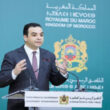This feat is particularly due to the development of the Tanger Med port complex, which has contributed to the rise of Morocco in the top twenty of the ranking of the Maritime Connectivity Index of the United Nations Conference on Trade and Development (UNCTAD), said the minister who presided over the opening ceremony of the 46th and 17th meeting of the scientific research groups on the implementation of the relevant provisions of the London Convention of 1972 and its protocol of 1996.
“Aware of the importance of maritime transport in the economic and social development and complementarity of economies worldwide, Morocco has endeavored to develop a network of modern port infrastructure that meet international standards,” he said, adding that Morocco has 43 ports spread along its Atlantic and Mediterranean coasts, with a length that reaches 3,500 km, and 14 ports dedicated to international trade.
In this regard, Abdeljalil added that in order to consolidate its role as a pioneer country, Morocco has concluded a set of bilateral agreements relating to the field of ports and commercial navigation, and which relate to port management, maritime safety, protection of the marine environment, search and rescue at sea, as well as the recognition of certificates of competency for sailors.
Morocco, which strongly supports the role of the International Maritime Organization (IMO), of which it is a member since 1962, he continued, is setting up programs for the exchange of experiences and transfer of skills, especially in the context of South-South cooperation, by hosting annually students and executives from African countries to follow training in various national institutions of maritime and port training.
In this sense, the government official, reiterated Morocco’s intention to continue to work alongside the rest of the member countries to develop regional programs of technical cooperation, in support of the IMO’s efforts, with the aim of strengthening the capacity of maritime administrations of developing countries, calling on member states to intensify their efforts to implement the commitments agreed to maintain a healthy and sustainable marine environment.










